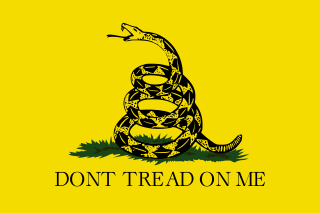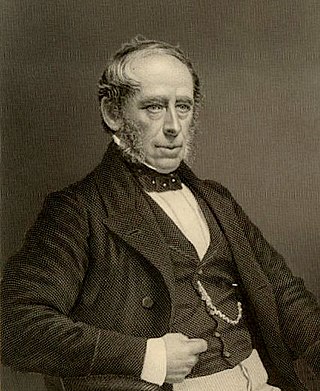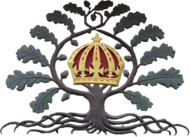One-nation conservatism, also known as one-nationism or Tory democracy, is a paternalistic form of British political conservatism. It advocates the preservation of established institutions and traditional principles within a political democracy, in combination with social and economic programmes designed to benefit the ordinary person. According to this political philosophy, society should be allowed to develop in an organic way, rather than being engineered. It argues that members of society have obligations towards each other and particularly emphasises paternalism, meaning that those who are privileged and wealthy should pass on their benefits. It argues that this elite should work to reconcile the interests of all social classes, including labour and management, rather than identifying the good of society solely with the interests of the business class.

Robert Peel Glanville Blatchford was an English socialist campaigner, journalist, and author in the United Kingdom. He was also noted as a prominent atheist, nationalist and opponent of eugenics. In the early 1920s, after the death of his wife, he turned towards spiritualism.
A Red Tory is an adherent of a centre-right or paternalistic-conservative political philosophy derived from the Tory tradition; it is most predominant in Canada, but also has a presence in the United Kingdom. This philosophy tends to favour communitarian social policies, while maintaining a degree of fiscal discipline and a respect of social and political order. It is contrasted with "Blue Tory" or "High Tory". Some Red Tories view themselves as small-c conservatives.
The nature of capitalism is criticized by left-wing anarchists, who reject hierarchy and advocate stateless societies based on non-hierarchical voluntary associations. Anarchism is generally defined as the libertarian philosophy which holds the state to be undesirable, unnecessary and harmful as well as opposing authoritarianism, illegitimate authority and hierarchical organization in the conduct of human relations. Capitalism is generally considered by scholars to be an economic system that includes private ownership of the means of production, creation of goods or services for profit or income, the accumulation of capital, competitive markets, voluntary exchange and wage labor, which have generally been opposed by most anarchists historically. Since capitalism is variously defined by sources and there is no general consensus among scholars on the definition nor on how the term should be used as a historical category, the designation is applied to a variety of historical cases, varying in time, geography, politics and culture.
Maurice John Cowling was a British historian. A fellow of Peterhouse, Cambridge, for most of his career, Cowling was a leading conservative exponent of the 'high politics' approach to political history.
Left-libertarianism, also known as left-wing libertarianism, or social libertarianism, is a political philosophy and type of libertarianism that stresses both individual freedom and social equality. Left-libertarianism represents several related yet distinct approaches to political and social theory. Its classical usage refers to anti-authoritarian varieties of left-wing politics such as anarchism, especially social anarchism, communalism, and libertarian Marxism, collectively termed libertarian socialism. A portion of the left wing of the green movement, including adherents of Murray Bookchin's social ecology, are also generally considered left-libertarian.

Sir Vernon Bernard Bogdanor is a British political scientist, historian, and research professor at the Institute for Contemporary British History at King's College London. He is also emeritus professor of politics and government at the University of Oxford and an emeritus fellow of Brasenose College, Oxford.
In the United Kingdom and elsewhere, High Toryism is the old traditionalist conservatism which is in line with the Toryism originating in the 16th century. High Tories and their worldview are sometimes at odds with the modernising elements of the Conservative Party. Historically, the late eighteenth-century conservatism derived from the Whig Edmund Burke and William Pitt the Younger marks a watershed from the "higher" or legitimist Toryism that was allied to Jacobitism.
The Old Right is an informal designation used for a branch of American conservatism that was most prominent from 1910 to the mid-1950s, but never became an organized movement. Most members were Republicans, although there was a conservative Democratic element based largely in the Southern United States. They are termed the "Old Right" to distinguish them from their New Right successors who came to prominence in the 1960s, 1970s and 1980s.
Libertarianism is a political philosophy that upholds liberty as a core value. Libertarians seek to maximize autonomy and political freedom, and minimize the state's encroachment on and violations of individual liberties; emphasizing the rule of law, pluralism, cosmopolitanism, cooperation, civil and political rights, bodily autonomy, freedom of association, free trade, freedom of expression, freedom of choice, freedom of movement, individualism, and voluntary association. Libertarians are often skeptical of or opposed to authority, state power, warfare, militarism and nationalism, but some libertarians diverge on the scope of their opposition to existing economic and political systems. Various schools of libertarian thought offer a range of views regarding the legitimate functions of state and private power. Different categorizations have been used to distinguish various forms of Libertarianism. Scholars distinguish libertarian views on the nature of property and capital, usually along left–right or socialist–capitalist lines. Libertarians of various schools were influenced by liberal ideas.

In the United States, libertarianism is a political philosophy promoting individual liberty. According to common meanings of conservatism and liberalism in the United States, libertarianism has been described as conservative on economic issues and liberal on personal freedom, often associated with a foreign policy of non-interventionism. Broadly, there are four principal traditions within libertarianism, namely the libertarianism that developed in the mid-20th century out of the revival tradition of classical liberalism in the United States after liberalism associated with the New Deal; the libertarianism developed in the 1950s by anarcho-capitalist author Murray Rothbard, who based it on the anti-New Deal Old Right and 19th-century libertarianism and American individualist anarchists such as Benjamin Tucker and Lysander Spooner while rejecting the labor theory of value in favor of Austrian School economics and the subjective theory of value; the libertarianism developed in the 1970s by Robert Nozick and founded in American and European classical liberal traditions; and the libertarianism associated with the Libertarian Party, which was founded in 1971, including politicians such as David Nolan and Ron Paul.

Ludwig Heinrich Edler von Mises was an Austrian-American Austrian School economist, historian, logician, and sociologist. Mises wrote and lectured extensively on the societal contributions of classical liberalism and the power of consumers. He is best known for his work on praxeology studies comparing communism and capitalism.
Right-libertarianism, also known as libertarian capitalism or right-wing libertarianism, is a libertarian political philosophy that supports capitalist property rights and defends market distribution of natural resources and private property. The term right-libertarianism is used to distinguish this class of views on the nature of property and capital from left-libertarianism, a type of libertarianism that combines self-ownership with an egalitarian approach to natural resources. In contrast to socialist libertarianism, right-libertarianism supports free-market capitalism. Like most forms of libertarianism, it supports civil liberties, especially natural law, negative rights, the non-aggression principle, and a major reversal of the modern welfare state.

For a New Liberty: The Libertarian Manifesto is a book by American economist and historian Murray Rothbard, in which the author promotes anarcho-capitalism. The work has been credited as an influence on modern libertarian thought and on part of the New Right.

The Clarion was a weekly newspaper published by Robert Blatchford, based in the United Kingdom. It was a socialist publication with a Britain-focused rather than internationalist perspective on political affairs, as seen in its support of the British involvement in the Anglo-Boer Wars and the First World War.
Bourgeois socialism or conservative socialism was a term used by Karl Marx and Friedrich Engels in various pieces, including in The Communist Manifesto. Conservative socialism was used as a rebuke by Marx for certain strains of socialism but has also been used by proponents of such a system. Bourgeois socialists are described as those that advocate for preserving the existing society while only attempting to eliminate perceived evils of the system. Conservative socialism and right-wing socialism are also used as a descriptor, and in some cases as a pejorative, by free-market conservative and right-libertarian movements and politicians to describe more economically interventionist strands of conservatism, such as paternalistic conservatism.
Paternalistic conservatism is a strand of conservatism, which reflects the belief that societies exist and develop organically and that members within them have obligations towards each other. There is particular emphasis on the paternalistic obligation, referencing the feudal concept of noblesse oblige, of those who are privileged and wealthy to the poorer parts of society. Consistent with principles such as duty, hierarchy, and organic unity, it can be seen as an outgrowth of traditionalist conservatism. Paternalistic conservatives do not support the individual or the state in principle but are instead prepared to support either or recommend a balance between the two depending on what is most practical.
Conservatism in the United Kingdom is related to its counterparts in other Western nations, but has a distinct tradition and has encompassed a wide range of theories over the decades of conservatism. The Conservative Party, which forms the mainstream centre-right party in Britain, has developed many different internal factions and ideologies.

The New Social Alliance or New Social Movement was an idea supported by some British Conservatives in 1871 for an alliance between working-class leaders and aristocratic Conservatives to ameliorate the conditions of the working class. The historian John Vincent has called the New Social Alliance "conservative socialism" and a "poor man's Young England".
Progressive conservatism is a political ideology that attempts to combine conservative and progressive policies. While still supportive of capitalist society, it stresses the importance of government intervention in order to improve human and environmental conditions.







